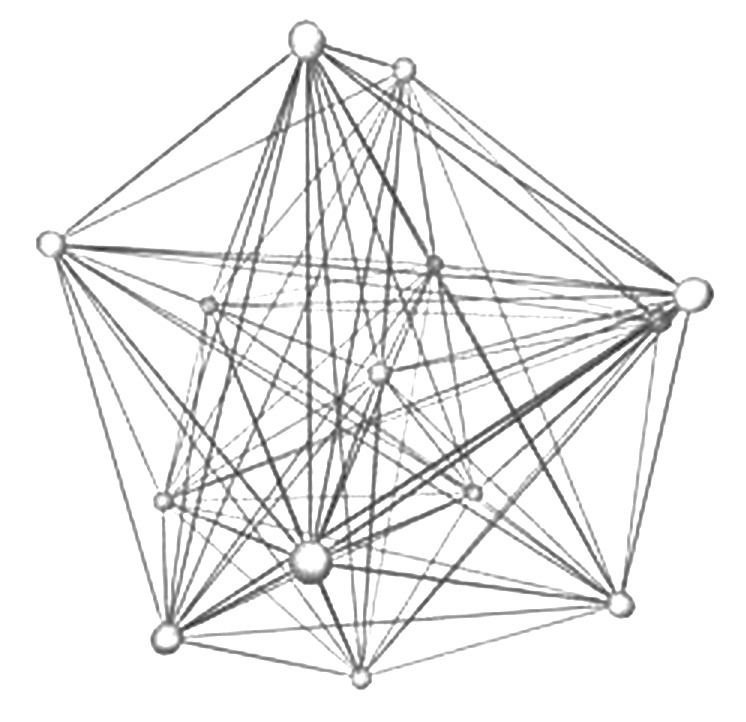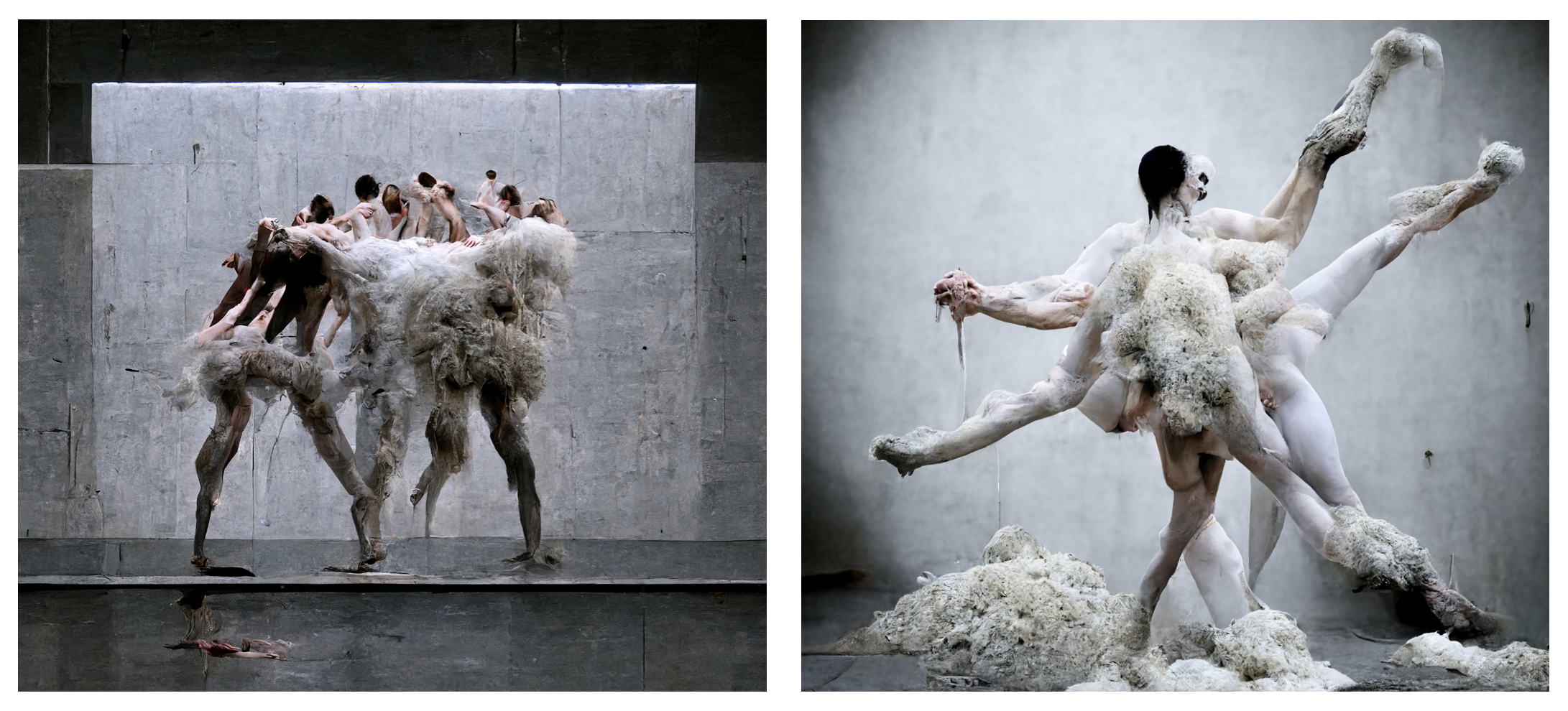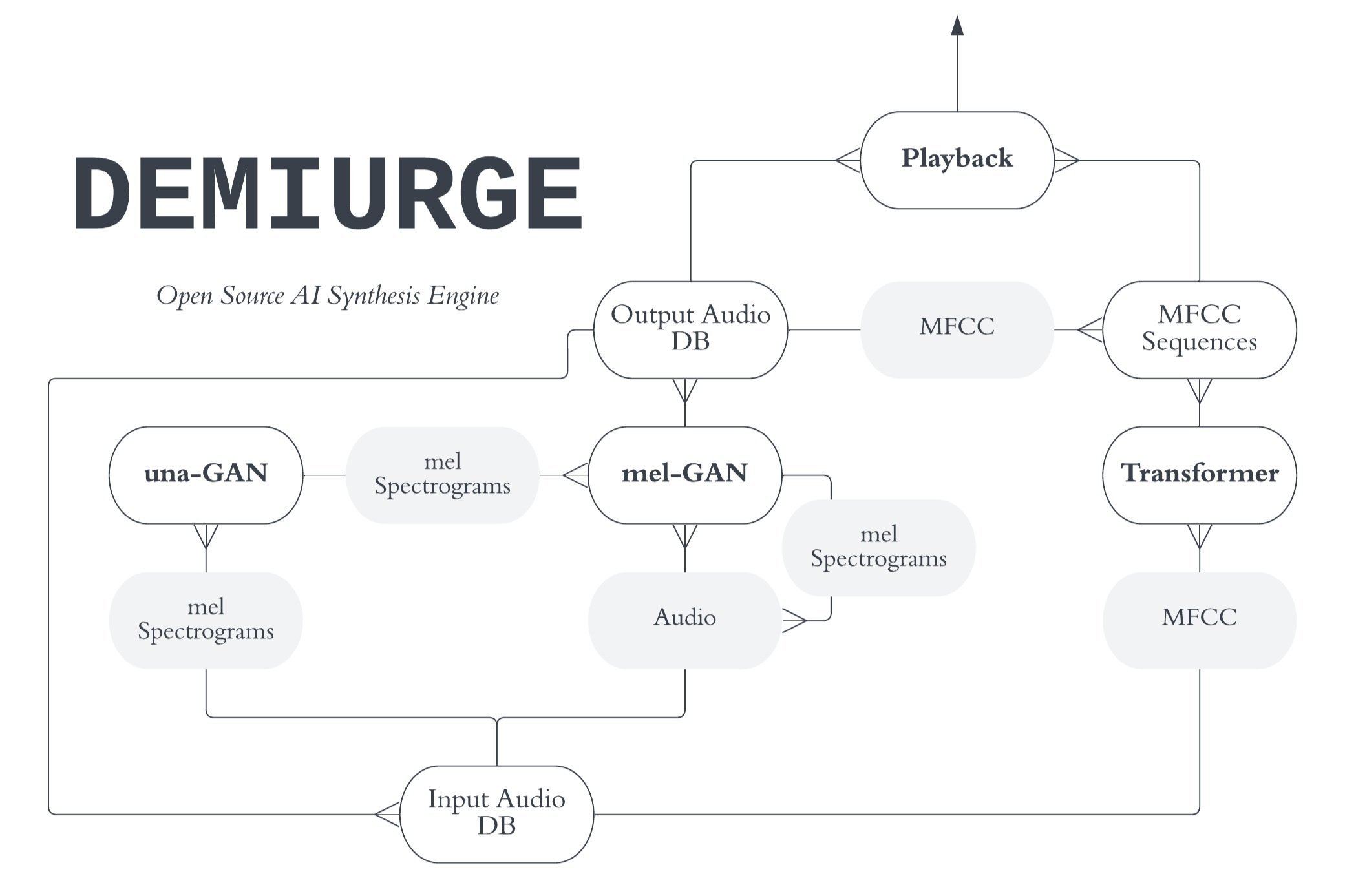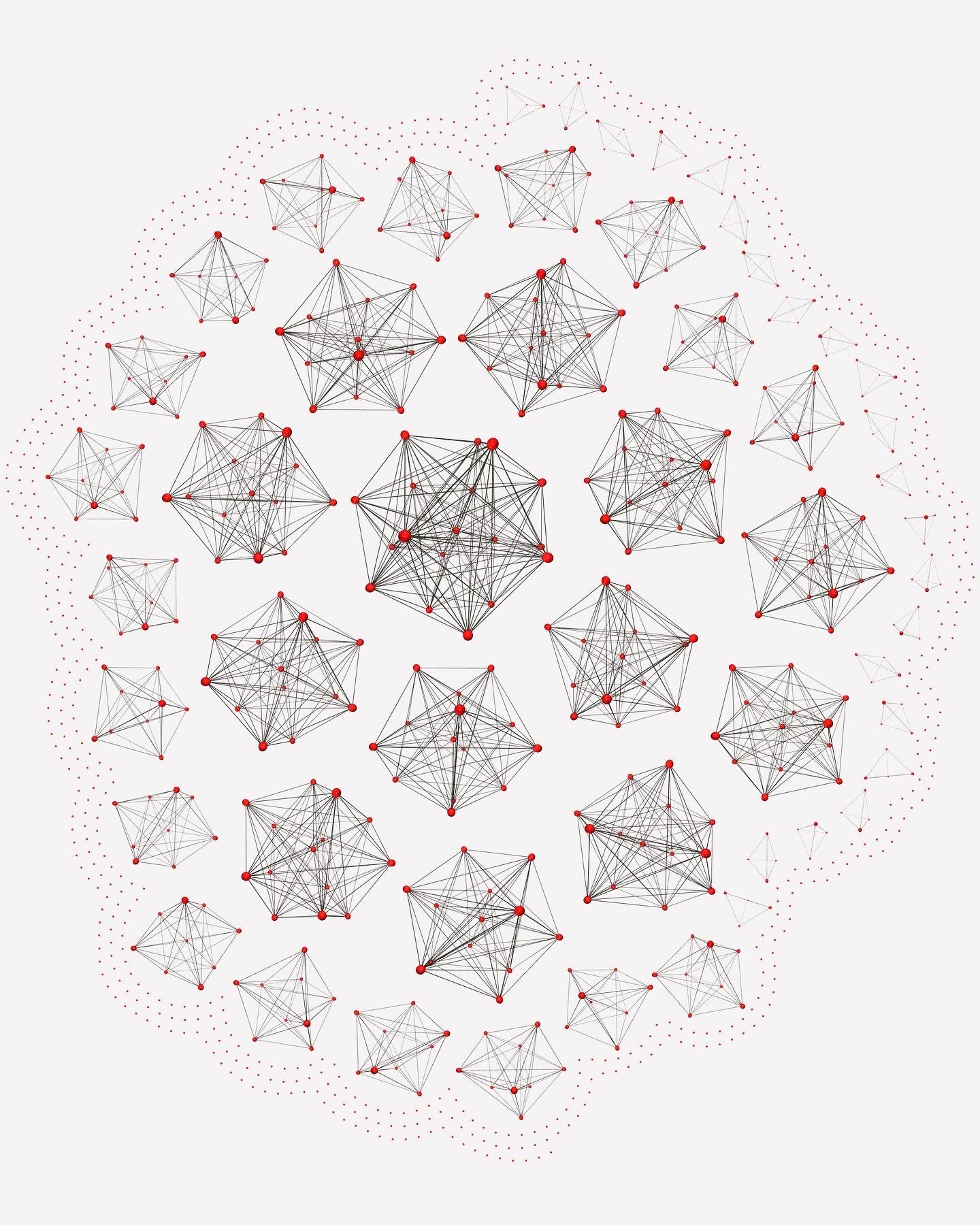
Deep Learning is a form of reproduction.
NPC
Non-Player Dynamics: Agency-Fetish in Game-World is a hyperlecture given by myself and Roberto Alonso Trillo to the philosophical community at Foreign Objekt, which kicked off a wide series of online discussions and debates around the reciprocal relationships between algorithm, embedding, and behavioral reuptake. The talk enumerates some of the feedback loops between people, computation, and software economics that determine the headwinds for future progress in LLM design and implementation. When we talk about AI as a reproductive object, this is exactly what we mean.
This is an exceptionally dense and technical talk. An approachable introduction to these concepts was featured on our favorite think-tank / community / podcast: New Models.
DISINTEGRATOR
Disintegrator is a podcast with cohost and research partner Roberto Alonso Trillo about the declining subject under the regime of algorithm and artificial intelligence. Topics of conversation include the ideological foundations of AI, the intersections of technology and politics, and the modes of expression and reconsumption through which humans traverse and embed themselves within digital space.
NovaraFM calls Disintegrator “the most sophisticated conversations about AI going.”
New episodes are up every other week.
Episode List:
11/13/23: Human is Not a Thing (w/ Reza Negarestani)
11/22/23: Free Labor, Hidden Labor (w/ Tiziana Terranova)
11/22/23: Deep Learning as Parasite (w/ Jon McCormack)
12/3/23: Capital Sticks to Itself (Marek Solo Ep.)
12/18/23: Unknown ‘x’ (w/ Luciana Parisi)
12/26/23: Choreomata Launch Panel (w/ Anil Bawa-Cavia, Jonathan Impett, Reza Negarestani, Keith Tilford, and Jennifer Walshe)
1/2/24: Autopoetics (w/ Sasha Stiles)
1/17/24: Protocols of Encounter (w/ Sofian Audry)
2/13/24: World Models (w/ Anil Bawa-Cavia)
3/12/24: Alignment (w/ Benjamin Bratton)
3/26/24: Voice (w/ Jennifer Walshe)
4/10/24: Reinventing the Surface (w/ Refik Anadol)
4/30/24: Piles (w/ Alex Reisner)
5/13/24: Fully Automated Luxury Gay Space Creative Production (Marek Solo Ep.)
5/28/24: Deathcare for the End of the World (w/ Patricia MacCormack)
6/11/24: Hyperlecture: Non-Player Dynamics (Marek & Roberto)
7/8/24: Systems (w/ Georgina Voss)
7/30/24: Sh*tshow Theory (w/ Mattin and Inigo Wilkins)
8/10/24: desubjective heaven (w/ angelicism01)
8/19/24: Computation is Computation (w/ M. Beatrice Fazi)
9/6/24: What is a World? (w/ Patricia Reed)
9/16/24: Anamnesis and Prosthetic Imagination (w/ Jonathan Impett)
10/31/24: Low-Power Mode (w/ Tega Brain)
11/14/24: LIFE (w/ Blaise Agüera y Arcas)
11/25/24: Janky (w/ Daniel Felstead & Jenn Leung)
12/11/24: The Club (w/ Li Zhenhua)
12/30/24: Nobody Listens to Music Anymore (Marek Solo Ep.)
1/23/25: A Girl is a Gun (w/ Alex Quicho)
2/4/25: CRIT (w/ Avocado Ibuprofen)
2/26/25: The Great Outdoors (w/ Gordon White)
WRITING
Marek’s writing on deep learning, experimental computer science, and related topics in cultural theory with research partner Roberto Alonso Trillo can be found on Leonardo (MIT Press), Organised Sound (Cambridge University Press), and a major new book co-edited and co-written by Marek and Roberto entitled Choreomata: Performance and Performativity After AI (Taylor & Francis) whose release will be articulated by a symposium at Foreign Objekt in December 2023.
The abstract for Choreomata:
Is artificial intelligence (AI) becoming more and more expressive, or is human thought adopting more and more structures from computation? What does it mean to perform oneself through AI, or to construct one’s subjectivity through AI? How does AI continue to complicate what it means to have a body? Has the golden age of AI, especially with regards to creative applications, already ended?
Choreomata: Performance and Performativity after AI is a book about performance and performativity, but more specifically, it is a book about the performance of artificiality and the performance of intelligence. Both humans and human-designed computational forces are thoroughly engaged in an entangled, mutual performance of AI. Choreomata spins up a latticework of interdisciplinary thought, pairing theoretical inquiry from philosophy, information theory, and computer science with practical case studies from visual art, dance, music, and social theory.
Through cross-disciplinary proportions and a diverse roster of contributors, this book contains insights for computer scientists, social scientists, industry professionals, artists, and beyond.
Choreomata features critical work from: Roberto Alonso Trillo, Refik Anadol, Sofian Audry, Barbara Bolt, AA Cavia, Catie Cuan, Jonathan Impett, Pelin Kivrak, Jon McCormack, Anna Munster, Tomás Musil, Peter Nelson, Reza Negarestani, Luciana Parisi, Rudolf Rosa, Mattin, Rudolf Rosa, Ned Rossiter, Alexander Schubert, Sasha Stiles, Tiziana Terranova, Keith Tilford, Jennifer Walshe, Davor Vincze, and Klára Vosecká.
DEMIURGE
Demiurge is a GAN-based raw audio synthesis engine. Demiurge was built in collaboration with research partner Roberto Alonso Trillo from 2020-22, within a research cluster in Hong Kong specializing in the application of Generative Adversarial Networks (GANs) to creative media.
Demurge’s central innovation comes from a distributed constellation of AI environments, which allows for a much greater degree of user customization than the technologies used by many of its peers. Demiurge focuses on hybridization, allowing its users to cross-modulate mel-spectrogram generators, phase vocoder models, and mutually-containing patches (much like the interface of a modular synthesizer, for example). Through this high degree of customization, a user starts to experience “the sensibilities of [AI] architectures” (“Music of Babel,” Leonardo 2022, 508). While these sensibilities are not necessarily “authentic to the architecture of the GANs and neural networks themselves” they unearth gnarly material otherwise lost through strict, functional mimesis-focused training: “recursive systems tend to aggregate and display certain intrinsic biases”, and “it is easier to apprehend the structure of an object with our senses as said object diverges from its resemblance to another assumed form” (ibid.).
Demiurge is the subject of an article for Leonardo (MIT Press), Debris (featuring a large list of collaborators), Hydra, Archon, a research residency at the Orpheus Institute (Ghent) in summer 2022, an article for Organised Sound (Cambridge University Press) in 2023, and is the launching project for an upcoming book for Routledge/CRC Press.
ARCHON
Archon is an open-source behavioral interface designed for Demiurge. It can be used with any database of lossless audio, providing a user with a nonlinear, dynamic experience of said database (useful especially for 20+GB databases that are otherwise difficult to traverse). Archon was developed in Minneapolis (US) and completed at the Orpheus Institute (Ghent) in summer 2022. Archon is written in Python and Supercollider, though Josiah Oberholtzer has a beautiful pure Python fork at his Github. Archon is featured on release for NEOS with recordings by Roberto Alonso Trillo and Christian Smith. Archon has been played in Spain, China, and Hong Kong in a variety of contexts.
Marek designed, wrote, and maintains Archon and developed it with experimental feedback from Roberto Alonso Trillo.
Reviews of the NEOS release:
[… D]iabolical, […] Archon emblematizes the triumph and tragedy of a technological progress that could not – and would not – stop within reasonable limits, twisting the knife in the wound of a forthcoming supplanting of machines at the expense of the same (and ironically the only) species that was able to design them. On the other hand, one can easily imagine with what smug amazement the two experimenters, before anyone else, have lent themselves to this game of deforming mirrors, letting their concrete sonic gestures kickstart an agitated phantom orchestra whose counterpoint, elaborated in real time, is so whimsical and overabundant as to almost completely obscure its matrix.
— Esoteros
Since in music we are always interested in how it sounds, we can say that it sounds excellent. Alonso's advanced violin techniques are in a riveting dialogue with surprisingly coherent electronic surfaces, and the result is excellent electroacoustic music.
— Kapital
Those involved in this creation have not wanted to confine themselves to the field of computer programming and have given birth to a slimy and terrifying creature, to which HR Giger could have given the go-ahead...
— Scherzo
Bienvenidos, por tanto, a la música de un futuro que es ya presente; un futuro en el que uno cree que los instrumentos acústicos tradicionales sí tendrán una presencia destacada, como la propia voz, las formaciones coral-instrumentales al uso, y, sin duda, estos nuevos lenguajes que Archon y Demiurge representan; siempre, eso sí, que se manejen sus potentísimos recursos con criterios artísticos de calidad y excelencia, como aquí es el caso.
— Sul Ponticello

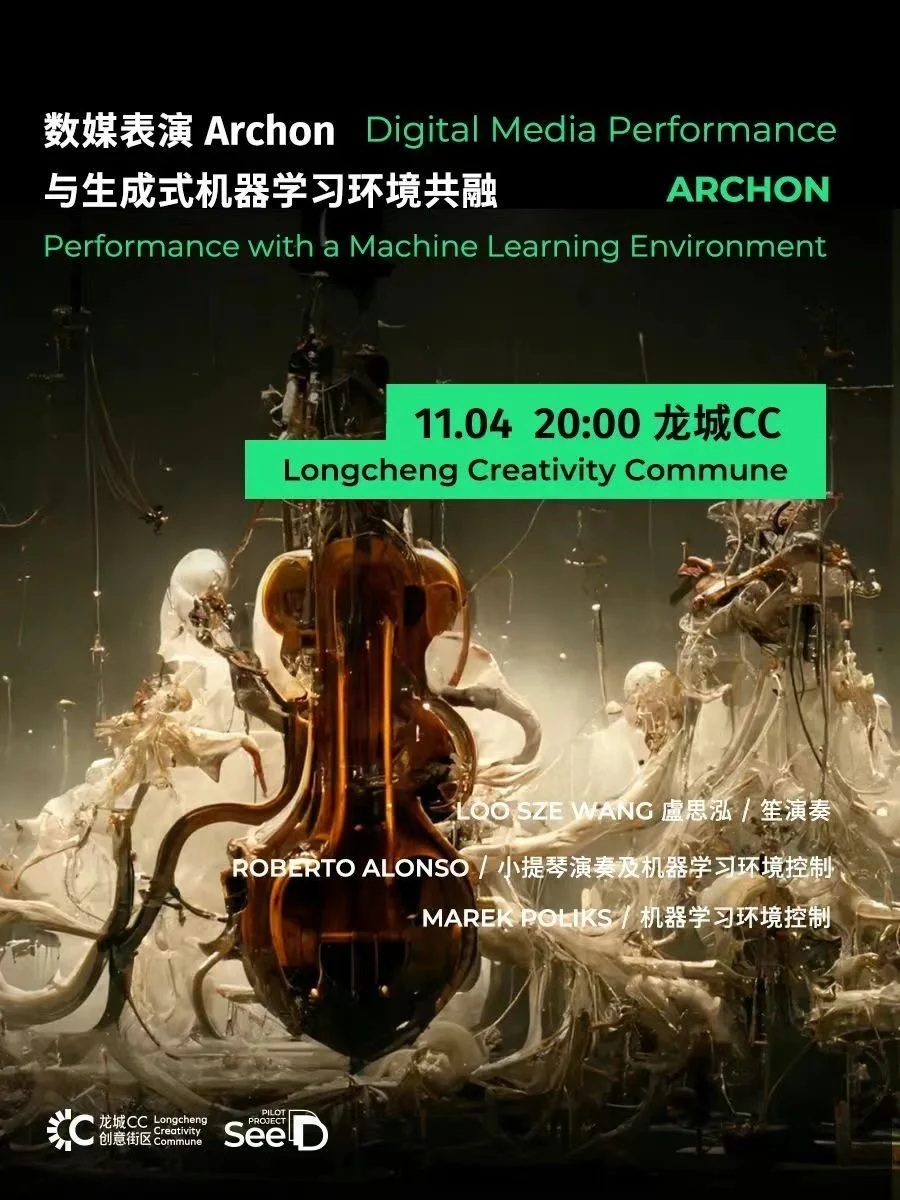
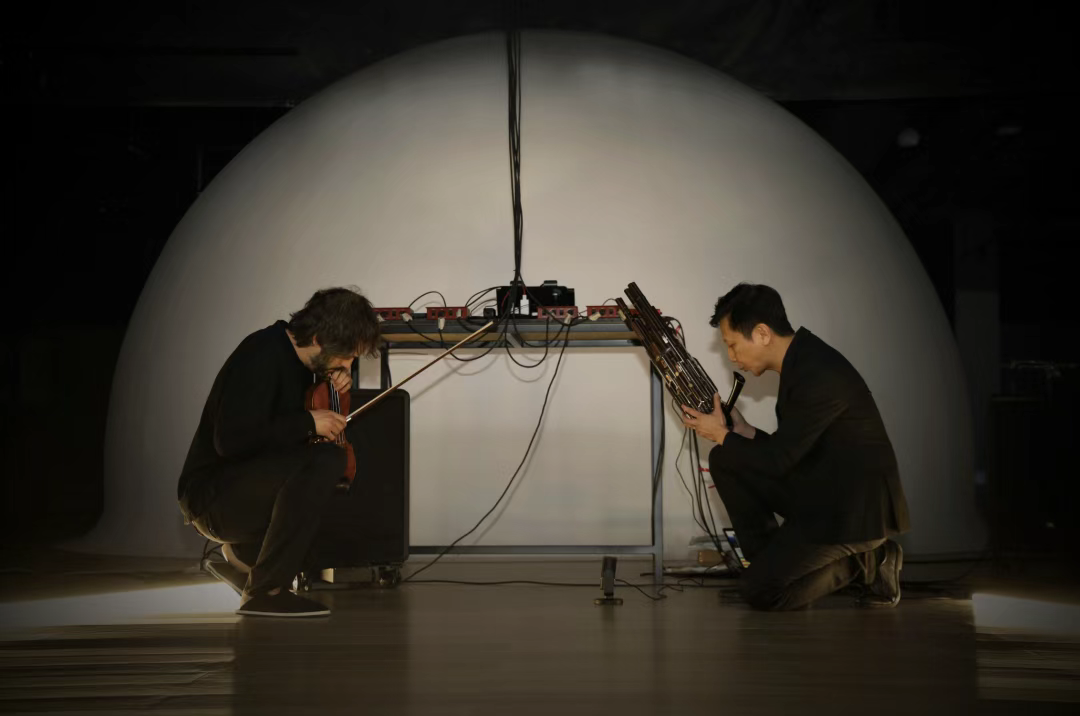





DEBRIS
Debris is a project spearheaded by research partner Roberto Alonso Trillo in order to leverage musical byproduct from the Demiurge synthesis environment into material for “recycling.”
From Trillo: “The fluid boundaries of the Debris move between linked theoretical discussions that range from archaeomusicology to new materialism, from the consideration of agency and mediation to an understanding of Debris as a Deleuzian assemblage, as an Adornian constellation, as an exemplification of swarm intelligence, or as a platform with its own network topology. These human-in-the-loop interactions, devised as overlapping narratives, offsprings of what we see as ubiquitous forms of xenobestiality, have been begotten by Didem Coskunseven (France/Turkey) / Mariam Gviniashvili (Georgia/Norway) / Kyoka (Japan/Germany) / Dariush Derakhshani (Germany/Iran) / David Q. Nguyen (USA) /Bihe Wen (China) / Stylianos Dimou (Greece) / Iván Ferrer Orozco (Mexico/Spain).”
These remixes, reworks, recycled objects are recorded on CD and released on Creotz Ediciones.
DAYMARKING
Daymarking (2022) was engineered for Dubai’s Museum of the Future in collaboration with Micah Silver (Polytope). Daymarking is a machine learning beat generation engine written in Supercollider and Python. It interpolates a given seed into a universe of nonrepeated rhythmic possibilities, varying the intensity of its output based on ambient activity and time of day. The engine further dynamically spatializes its material through a 34-channel audio system custom-built for this location.
